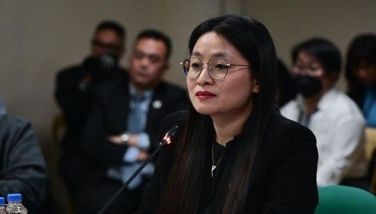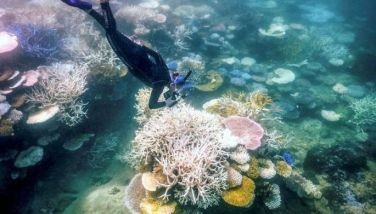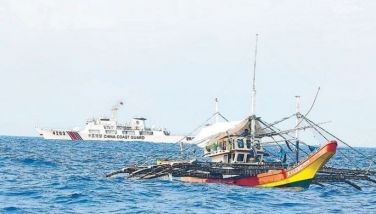IPI worried by attempts to ‘massage’ Beslan reports
September 9, 2004 | 12:00am
(As chairman of the Philippine National Committee of the International Press Institute, I am publishing the following in-depth report from our Vienna, Austria world headquarters on Moscow government efforts to apparently "muzzle" reporting on the terrorist-inflicted tragedy in southern Russia — Max V. Soliven, IPI Lifetime Fellow)
VIENNA — The International Press Institute (IPI), a worldwide network of editors and journalists, has criticized Russian authorities for what it believes is a "concerted attempt" to control the coverage of the Beslan hostage-taking that claimed more than 350 lives.
In a statement released on Tuesday, the Vienna-based IPI said journalists covering the hostage crisis had been forced to resign, detained and possibly even poisoned.
IPI Director Johann Fritz drew parallels with similar attempts "to conceal information from the public and limit the free flow of information" during the Kursk tragedy in 2000, when a Russian nuclear submarine sank in the Arctic Ocean, and the Moscow Theater hostage-taking in 2002.
"Not only is there continuing confusion about the numbers held hostage and those murdered by the terrorists, there appear to have been attempts at preventing certain journalists from traveling to the region. In addition, other journalists who may have upset the authorities with their own reports have been either detained or punished," he said.
On Sept. 6, Raf Shakirov, editor-in-chief of the daily newspaper Izvestiya, resigned. In an interview with Radio Liberty, he stated that he was forced to resign after the newspaper’s publisher, Prof-Media, informed him that they did not agree with the newspaper’s coverage of the hostage crisis in Beslan.
The newspaper published a large photo spread of the victims in its Sept. 4 edition, the day after the storming of the school, in order to convey that "this was a war." The publisher found the edition "too emotional."
The crew of the Georgian broadcasting company Rustavi 2, Nana Lezhava and cameraman Levan Tetvadze, were detained on Sept. 4 in Beslan, where they were covering the hostage crisis. On Sept. 6, local prosecutors charged Lezhava and Tetvadze, demanding the two Georgian citizens be sent for ten days’ pre-trial detention. They were accused of crossing the Russian border without a visa. As residents of Georgia’s Kazbegi region, and in accordance with an agreement between Russia and Georgia, they have the right to enter North Ossetian territory without a visa.
Two prominent Russian journalists known for their critical reports of the conflict in Chechnya were forced to delay their travel to North Ossetia under suspicious circumstances.
RFE/RL’s Andrei Babitsky was first detained at Moscow’s Vnukovo Airport when authorities accused him of carrying explosives in his luggage. Even after no explosives were found on him, he was later jailed after two men sought to provoke a fight with him while he was waiting for his flight. While the two men were also detained, Babitsky was charged with "hooliganism" and sentenced to five days in jail.
In a chilling incident reminiscent of the Soviet era, Anna Politkovskaya, a correspondent for Novaya gazeta, became ill after drinking tea during the first part of her flight to Beslan. She was diagnosed with acute food poisoning at a clinic in Rostov and returned to Moscow for treatment. Politkovskaya’s colleagues said she had not eaten anything else that day. Reports said the Novaya gazeta journalists were at first prevented from boarding their flight, but the captain of another flight recognized Politkovskaya and welcomed her on board.
IPI sources also reported on the detention of the Moscow bureau chief of the Arab satellite TV channel Al-Arabiya, Amro Abdel Hamid, at the airport in the southern Russian city of Mineralniye Vody. Hamid, an Egyptian who holds a Russian passport, was on his way to Moscow from Beslan, where he was covering the hostage crisis. Al-Arabiya was informed the journalist would be held for two days, but was not told why he was being detained.
Fritz said "elements of the state security apparatus" could be "acting to prevent reporting that might be embarrassing to the state."
"I fear the recent spate of press freedom violations go back to the adoption of the Doctrine of the Information Security of the Russian Federation in 2000 which called for ‘(the need to develop) special legal and organizational mechanisms to prevent unlawful information and psychological influences on the mass consciousness,’" he said.
He said allowing the media to "report freely" on the Beslan hostage crisis was the best insurance that the lessons of the "appalling tragedy" are not lost.
"Censorship will not help the Russian authorities in making sure that there is no repetition of such a terrible event. If Russia is to learn from events in recent days, it must be honest and truthful," he said. "The Russian people have a fundamental right to know how this event happened."
VIENNA — The International Press Institute (IPI), a worldwide network of editors and journalists, has criticized Russian authorities for what it believes is a "concerted attempt" to control the coverage of the Beslan hostage-taking that claimed more than 350 lives.
In a statement released on Tuesday, the Vienna-based IPI said journalists covering the hostage crisis had been forced to resign, detained and possibly even poisoned.
IPI Director Johann Fritz drew parallels with similar attempts "to conceal information from the public and limit the free flow of information" during the Kursk tragedy in 2000, when a Russian nuclear submarine sank in the Arctic Ocean, and the Moscow Theater hostage-taking in 2002.
"Not only is there continuing confusion about the numbers held hostage and those murdered by the terrorists, there appear to have been attempts at preventing certain journalists from traveling to the region. In addition, other journalists who may have upset the authorities with their own reports have been either detained or punished," he said.
On Sept. 6, Raf Shakirov, editor-in-chief of the daily newspaper Izvestiya, resigned. In an interview with Radio Liberty, he stated that he was forced to resign after the newspaper’s publisher, Prof-Media, informed him that they did not agree with the newspaper’s coverage of the hostage crisis in Beslan.
The newspaper published a large photo spread of the victims in its Sept. 4 edition, the day after the storming of the school, in order to convey that "this was a war." The publisher found the edition "too emotional."
The crew of the Georgian broadcasting company Rustavi 2, Nana Lezhava and cameraman Levan Tetvadze, were detained on Sept. 4 in Beslan, where they were covering the hostage crisis. On Sept. 6, local prosecutors charged Lezhava and Tetvadze, demanding the two Georgian citizens be sent for ten days’ pre-trial detention. They were accused of crossing the Russian border without a visa. As residents of Georgia’s Kazbegi region, and in accordance with an agreement between Russia and Georgia, they have the right to enter North Ossetian territory without a visa.
Two prominent Russian journalists known for their critical reports of the conflict in Chechnya were forced to delay their travel to North Ossetia under suspicious circumstances.
RFE/RL’s Andrei Babitsky was first detained at Moscow’s Vnukovo Airport when authorities accused him of carrying explosives in his luggage. Even after no explosives were found on him, he was later jailed after two men sought to provoke a fight with him while he was waiting for his flight. While the two men were also detained, Babitsky was charged with "hooliganism" and sentenced to five days in jail.
In a chilling incident reminiscent of the Soviet era, Anna Politkovskaya, a correspondent for Novaya gazeta, became ill after drinking tea during the first part of her flight to Beslan. She was diagnosed with acute food poisoning at a clinic in Rostov and returned to Moscow for treatment. Politkovskaya’s colleagues said she had not eaten anything else that day. Reports said the Novaya gazeta journalists were at first prevented from boarding their flight, but the captain of another flight recognized Politkovskaya and welcomed her on board.
IPI sources also reported on the detention of the Moscow bureau chief of the Arab satellite TV channel Al-Arabiya, Amro Abdel Hamid, at the airport in the southern Russian city of Mineralniye Vody. Hamid, an Egyptian who holds a Russian passport, was on his way to Moscow from Beslan, where he was covering the hostage crisis. Al-Arabiya was informed the journalist would be held for two days, but was not told why he was being detained.
Fritz said "elements of the state security apparatus" could be "acting to prevent reporting that might be embarrassing to the state."
"I fear the recent spate of press freedom violations go back to the adoption of the Doctrine of the Information Security of the Russian Federation in 2000 which called for ‘(the need to develop) special legal and organizational mechanisms to prevent unlawful information and psychological influences on the mass consciousness,’" he said.
He said allowing the media to "report freely" on the Beslan hostage crisis was the best insurance that the lessons of the "appalling tragedy" are not lost.
"Censorship will not help the Russian authorities in making sure that there is no repetition of such a terrible event. If Russia is to learn from events in recent days, it must be honest and truthful," he said. "The Russian people have a fundamental right to know how this event happened."
BrandSpace Articles
<
>
- Latest
- Trending
Trending
Latest
Trending
Latest
Recommended




























